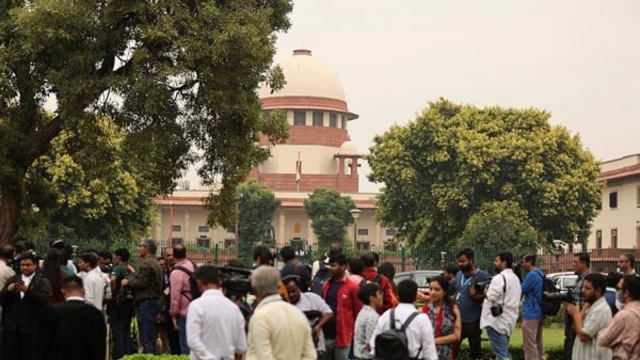 Courts at all levels, including Magistrate Courts, Sessions Courts, and High Courts, are largely unaware of the implementation of these new laws, which could lead to chaos in an already overburdened judiciary. (Express photo)
Courts at all levels, including Magistrate Courts, Sessions Courts, and High Courts, are largely unaware of the implementation of these new laws, which could lead to chaos in an already overburdened judiciary. (Express photo)Written By APS Deol
Starting midnight on June 30, three new major criminal acts will replace the Indian Penal Code (IPC) 1860, the Code of Criminal Procedure (CrPC) 1973, and the Indian Evidence Act 1872. Surprisingly, there has been little discussion in the media, law enforcement agencies, or online platforms about this significant change. Consequently, courts at all levels, including Magistrate Courts, Sessions Courts, and High Courts, are largely unaware of the implementation of these new laws, which could lead to chaos in an already overburdened judiciary.
As a criminal lawyer, I believe the new laws are necessary updates to the outdated IPC enacted in 1860 under Lord Thomas Babington Macaulay. It is essential to modernise the legal system to provide speedy justice and make the law more relevant to contemporary times.
In a welcome step, the new laws introduce community service as a punishment for minor offences, including defamation, which was previously punishable under Section 500 IPC and is now covered under Section 356(2) BNS-2023.
This section provides simple imprisonment for up to two years, a fine, or community service. This addition of community service for defamation, now defined under Section 356(1) BNS-2023, is a positive change, as the old defamation laws were often misused against political opponents or to silence dissent. However, certain new provisions are a cause for concern and need a thorough debate by all the stakeholders.
Here are some of the significant provisions
1. Mob Lynching: Section 103(2) BNS-2023, punishable by death or life imprisonment and a fine.
2. Organized Crime: Section 111 BNS-2023, which includes crimes like hawala transactions and mass marketing fraud, is punishable by death or life imprisonment if it results in death, and imprisonment of not less than five years otherwise.
3. Petty Organised Crime: Section 112 BNS-2023 covers theft, snatching, cheating, and unauthorized ticket sales, crimes which are punishable by one to seven years of imprisonment.
4. Section 113-BNS-2023 defines the “Terrorist Act,” a new provision introduced in BNS-2023. The definition mirrors Section 15 of The Unlawful Activities (Prevention) Act 1967, with penalties including death or life imprisonment. Due to the overlap between Section 113 BNS-2023 and Section 15 UAPA, an explanation has been added to Section 113-BNS-2023 to clarify that an officer not below the rank of Superintendent of Police will decide whether to register the case under Section 113 BNS-2023 or UAPA 1967. This gives more power to the state government, which could potentially misuse it against ordinary criminals out of vengeance or other extraneous reasons.
5. The comparative study of BNSS-2023, replacing the Code of Criminal Procedure 1973, shows the simplification of many archaic and redundant provisions. However, the new provisions for investigation procedures, particularly Section 167 CrPC. (now Section 187 BNSS-2023), raise concerns. Section 187(2) BNSS-2023 allows for a remand period of up to 15 days at any time during the initial 40 or 60 days of detention, depending on the case, which complicates matters.
This provision permits the police to seek remand even after the initial remand period is over, effectively delaying bail for the accused. No bail application can be entertained while the accused is under police remand during the initial 60 days of detention. This can be misused by the police to delay bail consideration by the Magistrate, Sessions Court, or even the High Court. Although intended to gather further evidence during the initial detention period, this draconian provision can severely impact the liberty of any accused.
6. The new Section 173 BNSS-2023 replaces the old Section 154 CrPC, allowing for a 14-day preliminary inquiry to check false complaints. This aligns with the Supreme Court’s ruling in “Lalita Kumari vs. Govt. of U.P.”
7. Another beneficial provision is the time-bound completion of investigations (Section 193 BNSS-2023), which mandates electronic communication of investigation progress and final reports.
8. The new code reduces the total sections from 511 (IPC) to 357 (BNS-2023) and includes a repeal clause (Section 358 BNS-2023). Despite the repeal, actions taken under the old code remain valid.
9. The familiar anticipatory bail provision (Section 438 CrPC) is now Section 482 BNSS-2023. The inherent power of the High Court to prevent abuse of process and secure justice is retained in Section 528 BNSS-2023.
Adapting these new laws will be challenging for the judiciary and law enforcement. Comprehensive training programs, workshops, and seminars are crucial to ensure that lawyers, police officers, and judges effectively understand and implement these changes.
(The writer is a Senior Advocate at Punjab and Haryana High Court and a former advocate general of Punjab)
Stay updated with the latest - Click here to follow us on Instagram

